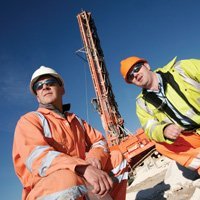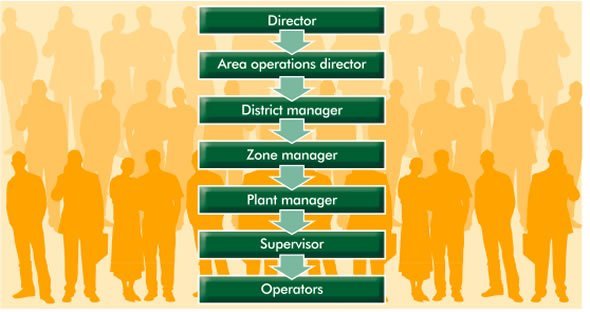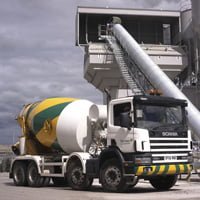A Nottingham County Surveyor, Edgar Purnell Hooley, discovered tarmac by accident in the early 20th century. He found a barrel of tar had spilled onto the road at a local ironworks. This had mixed with waste slag from the furnaces. The result was a dust-free, strong surface. Hooley created and patented the product that could take the weight of the new automobile. In 1903 the Tarmacadam syndicate was formed, its name taken from the developer of the road construction system, John MacAdam.

Tarmac employs 12,500 people and has an annual turnover of £2.1 billion. It operates in many countries, including the UK, Poland, India and the Middle East. In 2005 it produced 76.8 million tons of aggregates. An example of Tarmac construction is the ceiling of Canary Wharf Station in London.
Tarmac aims to provide customers with high quality products and services in line with its mission statement.
This case study shows how Tarmac focuses on attracting and keeping the right staff and ensuring its employees have the right skills and expertise to grow the company.
In an organisation as large and diverse as Tarmac, there are many different jobs. The structure is complex, so individuals within the business need to understand their roles and responsibilities. This enables the whole workforce to work together and achieve Tarmac’s aims and objectives.
Operations is a key functional area at Tarmac. This is where a number of processes come together to make the products or services to satisfy customer needs. Tarmac Operations has support services in:
- Human resources (HR) This includes planning for and forecasting staff requirements, and managing recruitment and selection. The HR team ensures that managers apply HR policies and procedures consistently across the business. The development of staff is a key priority within Tarmac.
- Finance manages and monitors the flow of money across the business. The finance team produces financial and management accounts and supporting information. Financial accounts deal with financial transactions, such as profit and loss accounts. These satisfy the organisation’s legal financial requirements. Management accounts look forward and contribute to the strategic decision making process by forecasting financial performance.
- Strategy, Marketing & Technical. By understanding customer needs, the marketing function can inform the overall business strategy. It also ensures that Tarmac”s image and brand reflect its high quality and success. The technical team looks for innovative solutions to keep Tarmac”s profile high in the market.
Within these functional areas, Tarmac has three main levels of staff.
Managers – organise and plan their departments to exceed the expectation of internal end external customers. They work closely with other managers across the company to promote a range of benefits, including:
- continuous process improvements
- improving accuracy
- reducing the need to repeat work
- driving up efficiency year on year.
Supervisors – work with managers to ensure that operators apply procedures and practices consistently. This involves using best practice to create value-added services across the business.
Operators – are responsible for day-to-day operations of the business. This is the level at which a graduate might enter the organisation in order to learn all aspects of the business. The role requires accuracy, efficiency and a high level of individual responsibility. Graduates can achieve rapid progress to more senior levels in the business.

This team leads and coordinates training, learning and development opportunities. These enable people at all levels to acquire and practice high levels of skill and expertise. This means individuals can achieve their personal goals, as well as contributing to the wider mission and vision of the organisation.
The Operations function brings together raw materials with the production process to make products that customers need. It also shares ideas across the company about how to improve processes or achieve cost savings. This is known as best practice.
The benefits are wide-ranging, such as increased efficiency and more effective management of health and safety and environmental issues. For example, Tarmac is implementing sustainable projects such as restoring quarries after use. It is also working with its suppliers to make the movement of goods more energy efficient.

Zone managers
A Zone Manager”s job includes managing operational performance in that zone to meet or improve targets for cost, quality, delivery, safety and business integrity. The long-term aim is to develop high performance teams who work within a culture of quality and continuous improvement.
- motivating the team through coaching and leadership
- identifying priorities for continuous improvement
- encouraging and rewarding staff who contribute improvement ideas and actions
- emphasising the importance of developing skills and capabilities
Tarmac employees have the opportunity to contribute their ideas on how to achieve results. This helps individuals gain a greater understanding of the business. Employees are more motivated because they feel a part of the whole structure and not simply a small fish in a large pool.

 Finance is critical to any business. All areas of the business need to have up-to-date information about its financial health. Financial reporting is a major part of this function. Tarmac has different routes for people to join the company, at both graduate level and through apprenticeship schemes. Graduate trainees enter this support function at Operator level.
Finance is critical to any business. All areas of the business need to have up-to-date information about its financial health. Financial reporting is a major part of this function. Tarmac has different routes for people to join the company, at both graduate level and through apprenticeship schemes. Graduate trainees enter this support function at Operator level.
Operator level
Lisa McKenzie – Credit Control Supervisor
‘I originally joined Tarmac many years ago on an apprenticeship scheme I love the business and am very happy here. As a Credit Control Supervisor, I have a very clear focus. My job is business critical without money coming in, the company cannot run properly. My favourite parts of my job are definitely the “people contact”, plus seeing the rewards of what you do immediately. Every day brings a different challenge. I need to be flexible to find solutions to whatever problems come my way.’
Standards of reporting and accounting need to be the same across all parts of Tarmac’s business. This is so that the organisation has a clear and accurate picture of its performance. This is a huge task and good team working is essential to ensure that operators, supervisors, managers and the financial controller all follow the same practices.
Simon Howell – UK Credit Control Manager
‘I joined Tarmac because I liked its approach although it is the biggest company in its field, it has a more “co-operative” spirit. Every time I see a Tarmac lorry, I get a sense of pride at being a part of the company. In my job I need to balance individual accounts alongside the corporate budget so I deal not just with money but also with Tarmac”s customers this gives me the biggest buzz.’

Human Resources Management is an important asset to any business. It provides expertise in:
- managing change and facilitating training and development
- recruitment, selection and employee relations
- pensions and benefits
- communicating with employees
Tarmac aims to build the capacity and capability of its people to achieve their full potential. This strategy strengthens the business in the long term.
HR management
An HR manager’s role is to ensure that business managers apply HR policies and procedures consistently through all business units. This helps to develop partnerships across different teams, which supports corporate aims and objectives.
Damian McKenna Building Products HR and Training Manager
‘I joined Tarmac because I wanted to work for a large, multi-site company with a national presence. My key role is in Employee Relations. This deals with improving employee performance and capability for the company and involves many different aspects. It includes ensuring we have appropriate numbers of staff, performance management, training and development, and dealing with absence. I get enjoyment from the sheer variety of what I do. Tarmac needs to remain competitive so we need to evaluate how we do things on a regular basis. This means there is constant change, which is exciting.’
Change management
Businesses have to respond to rapidly changing markets and conditions in order to remain competitive and grow. Developments in technology, competition from new or emerging markets, changing tastes and fashions, and changes to the law can all affect a business.
Tarmac has put in place a programme of Change Management to respond to these issues and to improve performance and motivate staff. To make this happen, Tarmac is training managers to move from an autocratic (or top-down approach) to a coaching style of management.
- An autocratic manager tells people what to do and how to do it. This may be necessary if a job is urgent or needs to be done in a particular way, for example, for health and safety reasons.
- A coaching manager focuses on developing employees to manage themselves rather than managing every task. This means that they can find a way to achieve results and learn from the experience. This makes employees more motivated and better able to deal with future situations.

Tarmac’s business involves much more than building and maintaining roads. It is a multinational business and serves different types of customers across its business activities.
To maintain its competitive advantage, Tarmac needs to have employees with high levels of skill. To support this, it provides career development opportunities across a wide variety of job roles.
Tarmac’s change management programme ensures that managers work closely to develop their staff. The staff benefit from developing their skills and potential through Tarmac’s positive commitment to progression. Tarmac benefits from the savings and quality enhancements arising from its process of continuous improvement.
